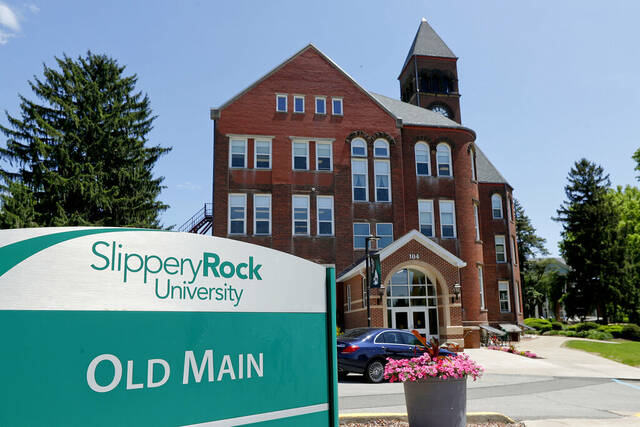https://naviga.triblive.com/news/pennsylvania/pa-state-university-system-adopts-enrollment-based-formula-for-distributing-state-dollars/
Pa. state university system adopts enrollment-based formula for distributing state dollars

The stakes over state investment in Pennsylvania’s State System of Higher Education got higher on Wednesday with the approval of a new enrollment-driven formula for allocating dollars to the system’s soon-to-be 10 universities.
The system’s governing board on Wednesday unanimously voted to implement a funding distribution formula that at the current level of funding that it receives, $477.5 million, “doesn’t work,” said Indiana University of Pennsylvania President Michael Driscoll, who led the team that crafted the formula over the past year.
“The sustainability of the system is just impossible to achieve,” he said. “It’s just a matter of [which university] runs out of money first and then who follows.”
However, if the system receives $552.5 million in the 2022-23 state budget — a $75 million increase that Gov. Tom Wolf supports and that is in line with the system’s request to the General Assembly, Driscoll said, “There is the real possibility that each of the universities can achieve … financial stability as long as we continue to aggressively manage our costs to our enrollment size and our revenue.”
Also key he said is receiving some one-time American Rescue Plan money to assist with transition costs to the new formula and more direct aid to students to make the cost of enrolling in a state university within the reach of under-represented minority and low-income students and adults who want to return to higher education to improve their job skills.
Those are the communities of students that system Chancellor Dan Greenstein said the system needs to draw to meet the state’s workforce development needs and to reverse its enrollment decline.
At an April hearing before two House committees, the chancellor said, “the students who we need to educate to credential or degree level in order to fill that workforce gap, they tend to come from backgrounds which are least able to pay the price that we’re required to charge because of the level of state investment.”
The formula provides for 75% of the state dollars the system receives to be allocated to universities based on the two-year average of their full-time equivalent student count with premiums for enrolling minority, low-income and adult students. Driscoll said that recognizes “those students often need additional support to to be successful.”
The formula also provides financial incentives for retaining students in their junior and senior years degree and to enroll graduate students to meet workforce demand for those with higher level credentials.
The remaining 25% of state dollars flowing to universities would be distributed to cover universities’ core operational costs.
Additional funding will be provided to Pennsylvania Western University and Commonwealth University, the two consolidated universities that will each support three separate campuses, and to Indiana University of Pennsylvania to support the high-cost doctoral programs it offers.
Rep. Tim Briggs, D-Montgomery County, said he is worried that the $75 million increase in funding the system is requesting won’t come to fruition. He implored the board to contact legislators “to say it’s imperative that we invest appropriately into the system.”
Faculty union President Ken Mash said while he appreciates the work that went into crafting the formula, faculty members remain concerned about how it could impact specific universities. He said he is hopeful the board will be open to more public discussion if the funding levels warrant it.
“There could probably be nothing more important than the funding of our universities and the public counts on the board to make sure that there is accountability,” Mash said.
The system universities include Cheyney, East Stroudsburg, Indiana, Kutztown, Millersville, Shippensburg, Slippery Rock and West Chester as well as the six universities that are being consolidated into two institutions on July 1. They are Pennsylvania Western University’s California, Clarion and Edinboro campuses, and Commonwealth University’s Bloomsburg, Lock Haven and Mansfield campuses.
Copyright ©2026— Trib Total Media, LLC (TribLIVE.com)
